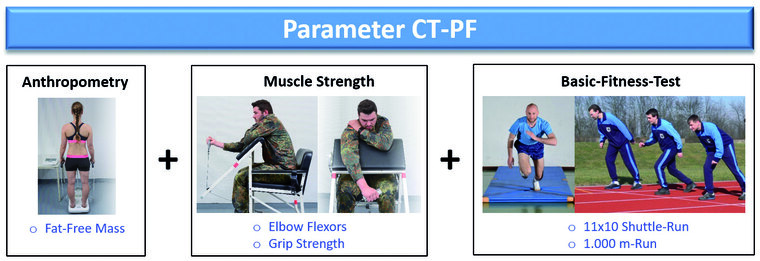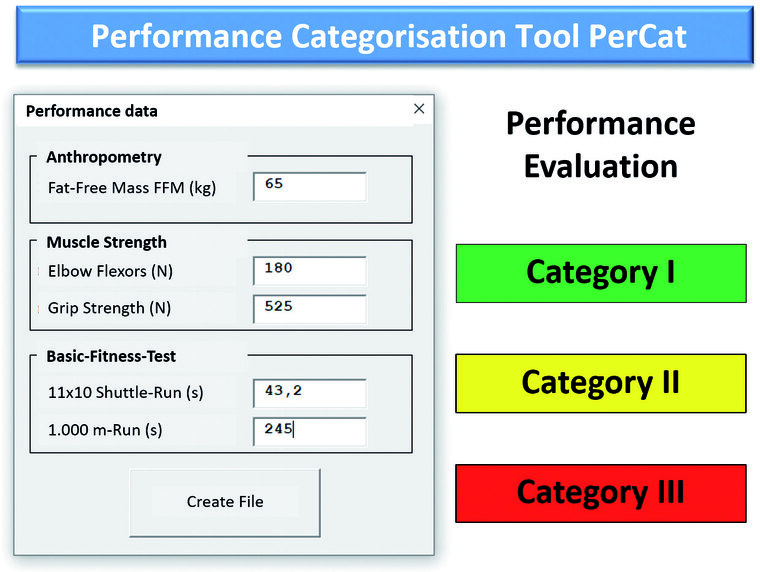Valid and efficient military medical assessment of physical fitness in the context of military demands: The new “CT-PF” system (Poster abstract)
Ulrich Rohdea, Dieter Hackfortb, Thomas Rütherb, Dieter Leykab
a Bundeswehr Institute for Preventive Medicine, Koblenz
b German Sport University Cologne – Research Group Epidemiology of Performance
Background
Physical inactivity and adverse lifestyle habits, such as smoking, too much fast food or soft drinks, are now part of everyday life for large sections of the population. The associated negative performance and health trends increasingly impact the Bundeswehr as well , as more and more service personnel are being affected . These general developments run counter to the continuing high physical demands of military activities in training and deployment. Therefore, adequate physical fitness (PF) is both a prerequisite (performance aspect) and an important preventive factor (prevention aspect) for the long-term preservation of operational readiness and health. Hence, assessment of individual physical fitness will become an increasingly important information factor for personnel and mission planning.
At present, no appropriate procedures to assess PF in the context of military demands are available within the current framework of military medical assessments. Against this background, the categorisation tool “CT-PF” was developed in a joint civil-military research project.
Methods
The following predictors for the assessment of strength, endurance and speed were pre-selected based on a systematic literature review and own research results :
- Sex, body height, body mass, BMI,
- Waist circumference, hip circumference, waist-to-height ratio, waist-to-hip ratio,
- Percentage of body fat, fat-free mass;
- Maximum isometric strength of arm flexors, knee extensors, trunk flexors, trunk extensors, and maximum isometric grip strength,
- Basic fitness test with 11x10 m shuttle-run/flexed arm hang/1000 m-run,
- Cycle ergometry with wattage and oxygen uptake as well as
- Lung function (vital capacity).
After extensive research (n = 130), predictors were tested against a general military requirement profile (Basic Military Fitness Tool BMFT 1 ) as a reference criterion using multiple linear regressions.
The final predictor selection was made
- with regard to the explanation of the criterion “BMFT-total time“ and
- taking into account the personnel, time, material and infrastructural requirements.
Results
The selected predictors of the categorisation instrument “CT-PF” (Figure 1)

Fig. 1: A few easy-to-gather parameters, supplemented by sex, facilitate the valid categorization of physical performance.
- 11x10 m shuttle-run (s),
- 1000 m-run (s),
- Fat-free mass FFM (kg),
- Maximum isometric strength of arm flexors (N),
- Maximum isometric grip strength (N), and
- Sex
enable reliable and valid categorization of PF using a traffic light system “green”–“yellow”–“red” (variance explained: corrected R² = 0.714).
Performance categorization takes place computer-assisted using the specifically developed software performance categorization tool “PerCat” (Figure 2). A comprehensive manual facilitates simple application of the “CT-PF”.

Fig. 2: The performance categorization tool “PerCat” translates the measured values into valid performance categories.
Conclusion
The “CT-PF” is a valid and efficient system to categorize PF directly related to a general military requirement profile. Low resource requirements (time, personnel, material and infrastructure) predestine the system not only for its application in the context of military medical assessment, but also for personnel recruitment.
Moreover, combining “CT-PF” performance data with additional health information within a centralized IT-structure may open up a variety of options for personnel management, prevention, training or mission preparation.
For the authors
Colonel (MC) Dr. Ulrich Rohde
Bundeswehr Institute for Preventive Medicine
E-mail: ulrichrohde@bundeswehr.org
This poster was awarded 3rd prize in the poster competition of the research institutes at the 52nd annual congress of the German Society for Military Medicine and Pharmacy e. V. in Coblenz, Germany, on October 16, 2021.
1 The BMFT simulates typical military demands such as movement under fire , pulling of loads , carrying of loads as well as lifting and setting down loads . A detailed description is available at https://wmm.pic-mediaserver.de/z202003/downloads/SGT_Handanweisung_190404_Intranet.pdf